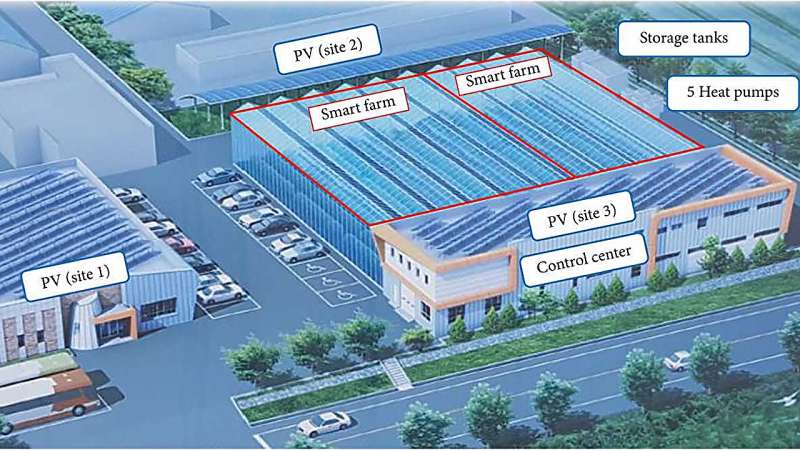This article has been reviewed according to Science X's editorial process and policies. Editors have highlighted the following attributes while ensuring the content's credibility:
fact-checked
trusted source
proofread
Study finds new methods for more sustainable farming with renewable energy systems

A study led by researchers at the Energy Institute has proposed a new energy system for a "smart farm" in South Korea which could reduce emissions, providing a blueprint for more sustainable farming practices.
The proposed energy system reduces CO2 emissions by almost 90% when compared to conventional fossil-based energy systems.
Focusing on the decarbonization of the farming sector by implementing a hybrid renewable decentralized energy system for a smart farm in South Korea, the system proposed by the study aims to meet the energy demands of the farm while minimizing its carbon footprint.
The study was a collaboration between researchers at the University of Sheffield, Korea Institute of Industrial Technology, Tanta University, and the University of Hull.
The energy system consists of solar panels, heat pumps, thermal energy storage tanks, and a wood pellet boiler. The system was assessed using meteorological data, which was taken on an hourly basis for accuracy and reliability.
The results showed the proposed hybrid energy system maintains a daily average temperature of 23.9°C inside the farm throughout the year, with a standard deviation of 2.16°C.
In terms of environmental impact, the study demonstrates that the hybrid energy system significantly reduces CO₂ emissions, achieving up to 88.94% reduction compared to conventional fossil-based energy systems. These findings offer a comprehensive evaluation of a low-carbon hybrid energy system, particularly applicable to greenhouses in South Korea and similar regions.
However, the system was found to be more expensive to run, meaning it could not compete with conventional energy systems in terms of cost unless its use was subsidized. The upfront costs are mainly attributed to the solar panels and the biomass boiler, while the operating expenditures are primarily influenced by the biomass feedstock.
The study, published in the International Journal of Energy Research, also highlights that to increase system resilience, waste-to-energy technologies, such as gasification and biomethanation, along with various energy storage technologies, could be incorporated.
By proposing a robust design and assessment of a renewable energy system, the research shows the positive impact that could be made in the farming sector's energy transition.
Professor Mohamed Pourkashanian, Director of the Energy Institute at the University of Sheffield and co-author of the paper, said, "Food production is set to double by 2050 to feed an increasing world population so it's vital we minimize the environmental impacts of intensified production. We're pleased this international collaboration shows the impact transitioning to a renewable energy system could have on reducing emissions in farming.
It also acts as a strong example of how systems like these could be adopted by others to reduce the emissions associated with farming. Although it's clear these systems would need to be subsidized to compete with the cost of more conventional fossil-based energy systems."
Won Yang, a principal researcher at the Korean Institute of Industrial Technology and one of the co-authors of the paper, said, "This study shows a hopeful result that integrating conventional energy systems with renewable energy can contribute to achieving net-zero emissions in an optimal way.
"Digitalization of the energy system was key, meaning this method could be applied to various energy systems in multiple industry sectors. Although there is still a long way to go in achieving net-zero emissions in the industry sector, I believe this collaborative study can help shorten the path to achieving this goal."
More information: Karim Rabea et al, A Comprehensive Technoeconomic and Environmental Evaluation of a Hybrid Renewable Energy System for a Smart Farm in South Korea, International Journal of Energy Research (2023). DOI: 10.1155/2023/4951589
Provided by University of Sheffield





















